Medicare Explained in Northeast Dallas
Talk to our insurance professionals. We can explain the Medicare program and its coverage thoroughly in Northeast Dallas so you can make informed choices.
Podcast: Medicare Basics
Medicare isn’t always easy to understand. That’s where Rothrock Insurance Solutions comes in. We can help you understand the program from top to bottom, and help you choose and enroll in the correct additional coverages to help you make the most of your Medicare benefits. Do you have to become an expert in Medicare? No, no more than you have to know how to perform surgery before you decide on a surgeon. But, it is important that you take the time to gain functional knowledge of how the program can work for you, and which coverage choices are available to you.
This is where we can really be of assistance. We are experts in Medicare, and we really look forward to working with you so that you can make the right choice. And best of all, working with us never costs you a dime.
Medicare Explained
What Is Medicare?
Medicare is the national health insurance program that is available to seniors who are 65 and older, as well as those who are under 65 but are receiving Social Security disability. The program is divided into four parts: Part A, B, C, and D.
Medicare Eligibility
Regardless if you are under 65 or over, there are several ways in which you can be eligible for Medicare.
Under 65
To be eligible for Medicare while under 65, you must:
- Be receiving Social Security disability income for 24 months
- Have End-Stage Renal Disease (ESRD)
- Have ALS (Lou Gehrig’s disease)
Turning 65
If you are approaching age 65, and meet the minimum work requirement (or are married to someone who does), then you can enroll into Medicare Part A and Part B during your Initial Enrollment Period. This is a 7-month window, beginning three months before your 65th birthday month, includes your birthday month, and ends three months after your 65th birthday month. One of the most important decisions you will have to make is deciding if you need to enroll when you are first eligible, or if you can delay your enrollment because you are still working and have coverage through your employer.
Switching from Group Coverage to Medicare – What Should You Do?
After Age 65
If you work for an employer with at least 20 employees and are on their group health plan, you can delay your Medicare enrollment without penalty until that is no longer the case, regardless of your age. But, everyone’s situation is unique, and it might be a better decision to go ahead and enroll into Medicare (and drop your group plan) when you are first eligible for Medicare, or it might not. This is where we can really help you make an informed decision
Original Medicare (Parts A and B)
Part A (Hospital Coverage) covers inpatient hospital stays, skilled nursing, home health care, and hospice care. In 2022, Medicare Part A has a $1556 deductible for a hospital stay.
Part B (Medical Coverage) covers doctor visits, preventive care, outpatient procedures, diagnostic testing, emergency room visits, and more. Part B covers 80% of the cost, and in 2022 has a $233 deductible.
Part A and Part B are also known as Original Medicare. These are the only two parts of Medicare that are directly administered by the government, and the card you will receive looks like this:

It is important to know every other type of Medicare, including Part C, Part D, or a Medicare Supplement, are all separate coverages offered through insurance companies.
Medicare Advantage (Part C)
Part C is another way to get your Medicare benefits through a health plan such as a PPO (Preferred Provider Organization or an HMO (Health Maintenance Organization). You must be enrolled into Parts A and B in order to be eligible for a Medicare Advantage Plan. Medicare Advantage plans must provide all the benefits of Original Medicare, but may have an additional monthly premium, co-pays, and different cost-sharing than Original Medicare. Many Medicare Advantage plans also offer additional coverage for dental, vision, or hearing services, and may also include prescription drug coverage.
Prescription Drug Coverage (Part D)
Part D are separate plans offered by insurance companies for prescriptions only. Plans will have a separate premium and probably a separate deductible. Even though there are several plans available to choose from, all Part D plans are regulated by Medicare and have the same basic structure (deductible, co-pays, coverage gap, and catastrophic coverage).
Medicare Supplements
Will My Doctor Take My Medicare Supplement?
Original Medicare (Parts A and B) doesn’t cover all of the costs of healthcare services and may leave you with substantial out-of-pocket costs. Medicare Supplement Insurance plans (also known as Medigap), are offered by insurance companies and can cover these “gaps” in Original Medicare, giving you significant financial protection. It is important to know that Medicare Supplement plans only pay their portion after Medicare has approved their portion of the Part A or Part B cost. It is also important to know that while there are many companies offering Medicare Supplements, plans are standardized by the government and will follow the same structure mandated by Medicare.
If you have a Medicare Supplement, you cannot also have a Medicare Advantage plan, or vice-versa.
Enrolling Into Medicare
How to Enroll Into Medicare Explained
Enrolling into Medicare starts with enrolling into Medicare Part A and B (Original Medicare) first. Anything else that you do (Enrolling into a Medicare Advantage Plan, or Medicare Supplement and a Part D Prescription Drug Plan) is contingent on this and is a separate step.
Automatic Enrollment into Medicare Part A and B
It’s actually the Social Security Administration that processes your enrollment into Medicare Part A and B. If you are already receiving monthly Social Security or Railroad Retirement benefits (remember most people are eligible for this at age 62), then you will be automatically enrolled into Medicare A and B and you should receive your Medicare card about 2-3 months before your 65th birthday. Medicare always starts on the first day of a month, and it will start on the first day of your 65th birthday month.
Also, if you qualify for Social Security Disability, even though you are not age 65, you will automatically be enrolled in Medicare A and B starting in the 25th month of receiving disability benefits.
3 Critical Medicare Enrollment Deadlines
Manual Enrolment into Medicare Part A and B
If you are approaching your 65th birthday and are not receiving Social Security benefits, then you will have to enroll into Medicare A and B yourself. You can do this starting in the third month before your 65th birthday month. Enrollment is easy – you can enroll online in your MySocial Security account, or call or go to a local Social Security office. You do not have to start your Social Security in order to start your Medicare.
Delayed Enrollment into Medicare Part A and B
If you or your spouse are still working and covered under the employer’s plan, and the company has 20 or more employees, you can stay on the group plan and delay your Medicare enrollment until that is no longer the case. Also, at any time after age 65, even if you are still working, you can choose to drop group coverage and enroll into Medicare A and B. Delayed enrollment requires an extra step and your employer will need to sign the Employer Information form attesting that you’ve had group coverage from the time you turned 65 until now. Once you get this form back, you can enroll into Medicare online or at a Social Security office.
Cost of Medicare
This is probably one of the most misunderstood facets of Medicare. Let’s look at it in detail:
Original Medicare (Part A and Part B)
Medicare Part A has no premium for most people, but if you have not earned 40 work credits in your lifetime, are not married to someone who has, or was married for less than 10 years to someone who has earned the credits, then Part A can cost as much as $499/mo (2022). Part B does have a standard monthly premium of $170.10/mo. in 2022. However, if your income exceeds a certain amount, it can be significantly more for Part B. Original Medicare (Part A and Part B) premiums can be paid monthly through a deduction from your Social Security or paid directly to Medicare through an optional bank draft or invoice. Below is a diagram that shows how higher income will affect your Part B premium:
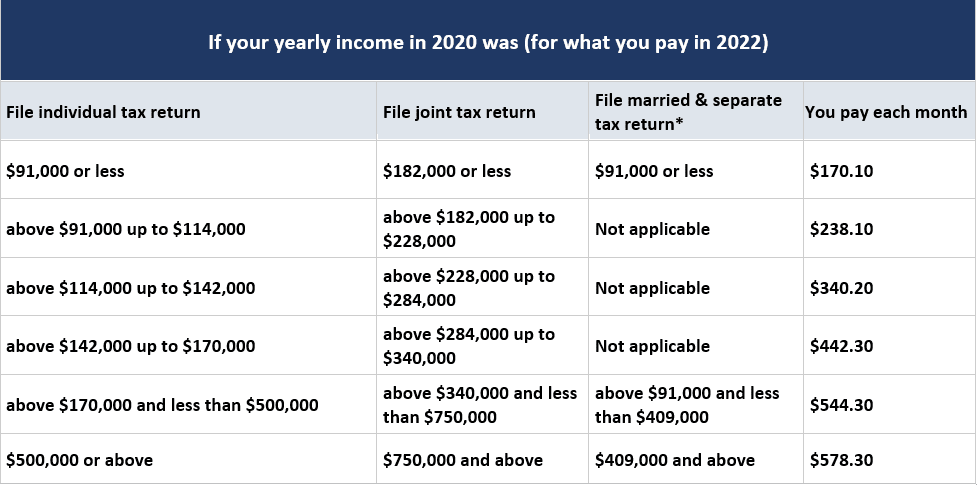
Cost for Medicare Advantage (Part C) and Prescription Drug (Part D) plans
Part C and D plans are all offered through insurance companies and can have their own separate premium in addition to the Medicare Part B premium. Part C and Part D Premiums can be paid monthly through a deduction from your Social Security or paid directly to the insurance company through an optional bank draft or invoice. Again, if your income exceeds a certain amount, you will pay an extra amount for Prescription coverage in addition to the regular premium. You will be responsible for paying this amount even if you receive your drug coverage through a $0 premium Medicare Advantage Plan. Here is the chart that shows how higher incomes will affect your Prescription Drug Plan costs:
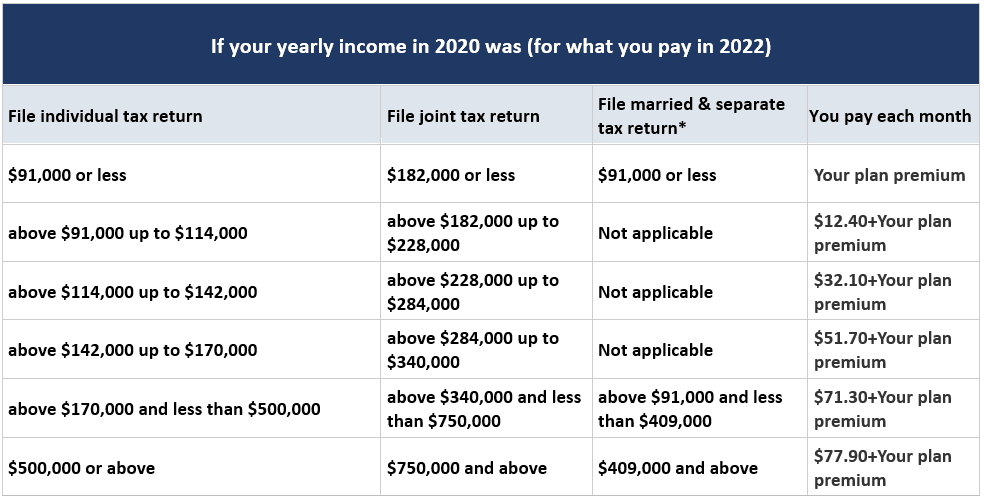
Low Income Programs
Medicaid
Sometimes people get Medicare and Medicaid confused. While Medicare is a Federal program with no income limits, Medicaid is a State run program for low income and low asset individuals. Every state has a Medicaid program, but it may be called something different in every state. It is possible for someone to have both Medicare and Medicaid, and there are special programs that are designed for those individuals.
Medicare Savings Programs
Your income level might qualify you for your State to pay for your Medicare Part B premium. The diagram below describes the level of income you need to be at or below in order to qualify.
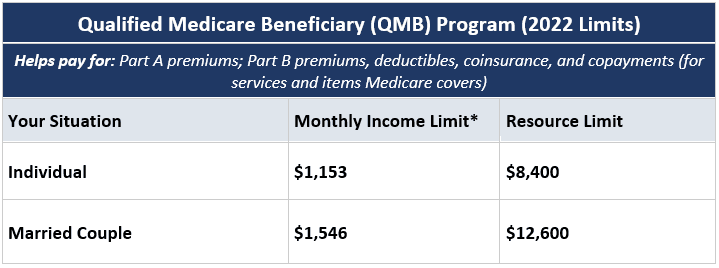
*Limits slightly higher in Alaska and Hawaii
If you qualify for the QMB program:
- Medicare providers aren’t allowed to bill you for services and items Medicare covers, including deductibles, coinsurance, and copayments. What should I do if I get a bill?
- You may get a bill for a small Medicaid copayment, if one applies.
- You’ll also get Extra Help paying for your prescription drugs. You’ll pay no more than $4 in 2022 for each drug covered by your Medicare drug plan.
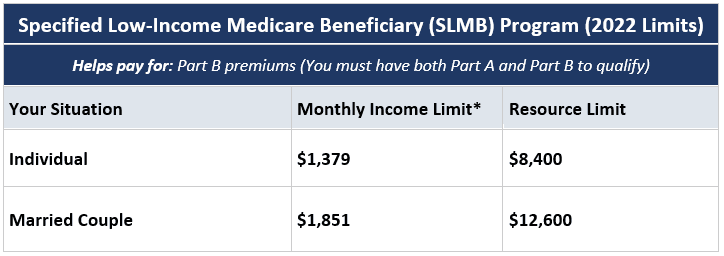
*Limits slightly higher in Alaska and Hawaii
If you qualify for the SLMB Program:
- You’ll also get Extra Help paying for your prescription drugs.
- You’ll pay no more than $9.85 in 2022 for each drug your Medicare drug plan covers.
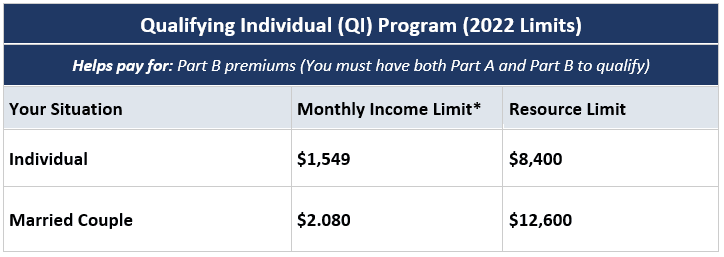
*Limits slightly higher in Alaska and Hawaii
If you qualify for the QI program:
- You must apply every year to stay in the QI Program.
- States approve applications on a first-come, first-served basis – priority is given to people who got QI benefits the previous year.
- You’ll also get Extra Help paying for your prescription drugs. You’ll pay no more than $9.85 in 2022 for each drug your Medicare drug plan covers
If you qualify for Medicaid, you can’t get help from the QI program, but you may qualify for help from another Medicare Savings Program.
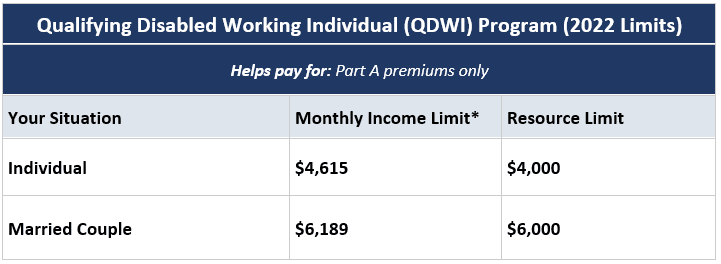
*Limits slightly higher in Alaska and Hawaii
You may qualify for the QDWI Program if you:
- Have a disability
- Are working
- Lost Your Social Security disability benefits and Medicare premium-free Part A because you returned to work
Extra Help for Prescription Drugs
Extra Help, also known as a Low-Income Subsidy, is a Federal program that can assist greatly with prescription drug costs including premiums, copays, deductibles, and co-insurance for low-income Medicare beneficiaries. The income limits are considerably higher than for someone to qualify for Medicaid, and some people might qualify and not even know it. If you or someone you know has any questions about this, we will be more than happy to help.
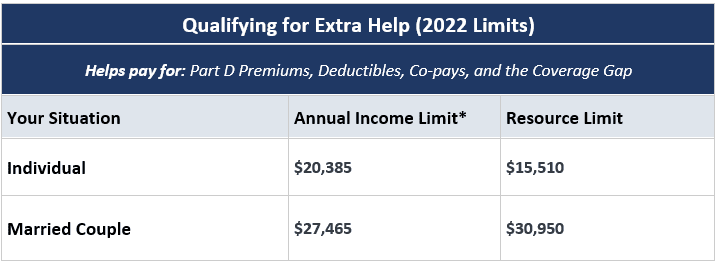
The 3 Choices That You Must Make Regarding Medicare
Understanding Your Medicare Choices
Medicare is all about you making choices, and there are three critical choices you must make when transitioning to Medicare.
Choice #1
Should I enroll into Medicare when I’m first eligible?
If you are no longer working, have retirement coverage, have an Affordable Care Act (Obamacare) health insurance plan, or no coverage at all, then there is really no choice here…you really need to go ahead and enroll into Medicare when you are first eligible (for most of us, that is when we turn 65). If you don’t, you will face a permanent penalty if you enroll later, and the longer you wait, the more this penalty will be. Perhaps more importantly, you will likely find yourself with no coverage whatsoever and if you get in an accident or get sick, you’ll find out that you may not be able to enroll into Medicare right away.
However, if you are still working and covered under your employer’s plan, then the choice is no longer crystal clear. The first factor is whether your employer has 20 0r more employees, or less than 20. If it’s 20 or more, then Medicare will be secondary coverage and you can delay your enrollment as long as you or your spouse continue to work there. But, everyone’s situation is unique, and you might be able to save significant money and lower your deductible by going ahead and transitioning to Medicare and dropping off your group plan, even though you will continue to work there. We are experts at helping you make that decision.
Choice #2
Medicare Advantage vs. Medicare Supplements
Now that I’m moving to Medicare, should I get a Medicare Supplement and a Part D drug plan, or a Medicare Advantage plan?
There is no right or wrong answer here, but in order for you to make an informed decision, it’s important that you know the difference between the two, and if you choose Medicare Advantage, that you have a good understanding of how your plan will work, how your medicines will be covered, if your doctors will take your plan, and what will fit your budget.
Choice #3
Why You Need an Agent
Will I try to figure this out by myself, or enlist the free help of an expert?
Imagine this – you are going to have a knee replacement, so you decide that you need to learn everything there is to know about knee replacements, which would include going to Medical school, doing your residency, studying under expert surgeons, assisting in surgeries, staying abreast of all the latest techniques and equipment, etc. Not feasible to say the least.
What you will do is talk to friends and family, research doctors, maybe get a 2nd or 3rd opinion, and make absolutely sure you are comfortable with your surgeon and care team before you have the procedure. In other words, you have to really trust the doctor.
With Insurance, it’s really no different. If you are going to utilize the services of an agent, you really have to trust them, AND know that they know what they’re doing.
The first thing that you should know is that it never costs you a dime to utilize our services. The reason is simple – we are compensated by the insurance company if we help you enroll in a Medicare Supplement, Part D or Part C plan. 100% of our compensation comes to us this way.
The second thing you should know is that it doesn’t matter how or where you purchase your policy, you will pay the exact same price. You see, insurance companies are not allowed to charge you more if you buy the policy through an agent and they have to pay that agent a commission, or charge you less if you call them up and buy it direct, or enroll online on their website.
Most insurance companies do maintain an expensive operation and it costs them a lot of money to train and maintain an internal sales team. Often, this type of insurance job is the first job an agent might get, and the chances of your agent being with the company year after year are virtually nil.
We have over 25 years combined experience, and are licensed by the states we sell in, and are appointed by every carrier we do business with. We have to renew our licenses every two years, and take multiple annual certifications for Medicare Advantage and Part D plans. Each carrier runs a background check on every agent they appoint, as does the state when we get licensed.
By utilizing an agent that knows what they’re doing, you gain the advantage of someone experienced who’s in your corner, who you can call at anytime if you ever have a problem with your coverage, or just have a question. We pride ourselves on being there for our clients, year after year. If you choose to do business with us, our relationship isn’t over once your application is approved, it’s just beginning! And again, you gain all this for the low price of zero.
